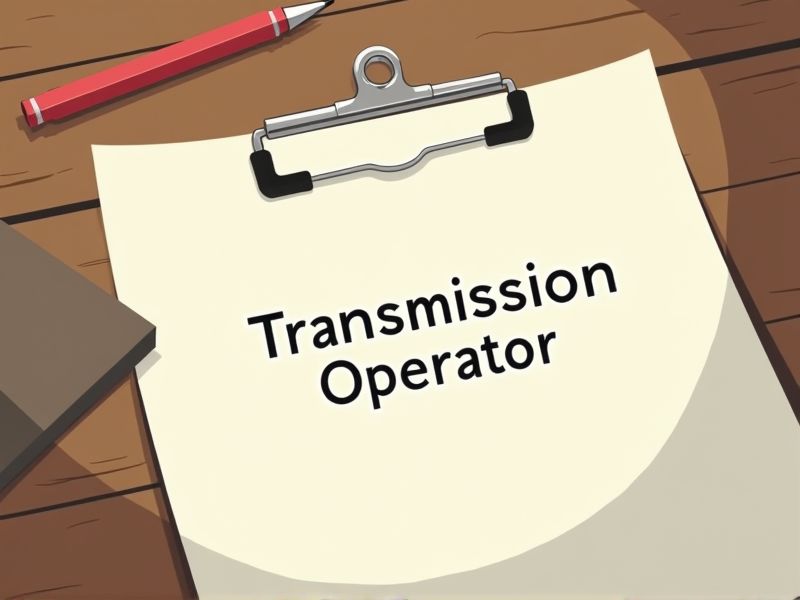
A Transmission Operator holds significant responsibility in managing and maintaining the electrical grid's reliability and stability. Specific certifications are crucial because they ensure the operator possesses the technical knowledge and skills necessary to handle complex systems effectively. These certifications also demonstrate a proven level of competence and adherence to industry standards, which is vital for safety and efficiency. Essential certifications for a Transmission Operator include the following ones.
NERC Transmission Operator Certification
The NERC Transmission Operator Certification ensures that operators have the knowledge and skills required to maintain a reliable power system, reducing the risk of blackouts. It standardizes training and qualifications across different operators, facilitating consistent operational practices. Compliance with certification requirements demonstrates an organization's commitment to meeting national reliability standards. The certification process enhances accountability and professionalism, ensuring operators can effectively address grid emergencies.
NERC Reliability Coordinator Certification
NERC Reliability Coordinator Certification ensures Transmission Operators possess the necessary expertise to maintain the reliability of the bulk power system. This certification verifies that individuals can identify, assess, and manage risks associated with transmission operations. Compliance with NERC standards minimizes the likelihood of grid disruptions, thereby enhancing system stability. Certified operators contribute to national efforts to support an uninterrupted power supply and safeguard against widespread blackouts.
Electrical Transmission Safety Certification (NFPA 70E)
The NFPA 70E certification is essential for transmission operators as it provides guidelines on electrical safety practices, minimizing workplace accidents. Compliance with this standard helps operators understand proper arc flash protection and risk assessment, which are critical in preventing electrical injuries. It supports organizations in meeting Occupational Safety and Health Administration (OSHA) regulations, thus avoiding potential penalties. Certified operators can better ensure continuity of operations by adhering to protocols that mitigate equipment damage from electrical hazards.
OSHA 30-Hour Certification
The OSHA 30-Hour Certification is crucial for Transmission Operators because it equips them with comprehensive safety training that is essential for managing high-risk environments. This certification reduces workplace accidents by educating operators on hazard recognition and risk prevention strategies. It ensures operators are familiar with OSHA regulations, fostering compliance and reducing legal liabilities for employers. The certification also contributes to creating a safer work culture, which enhances job performance and operational efficiency.
SCADA Systems Operation Certification
The SCADA Systems Operation Certification equips transmission operators with the necessary skills to effectively monitor and control complex energy networks, directly enhancing grid stability. Without certification, operators may lack the knowledge to implement security protocols, increasing vulnerability to cyber threats. Certification ensures that operators are proficient in real-time data analysis, crucial for timely decision-making and preventing outages. Given the evolving regulatory landscape, certified operators are better prepared to meet compliance requirements, reducing the risk of legal penalties.
Control Room Operations Certification
A Control Room Operations Certification ensures that transmission operators are equipped with the necessary skills to manage and maintain the reliability of the energy grid. Without proper certification, operators may lack crucial knowledge in responding effectively to grid emergencies or unexpected outages, leading to potential disruptions. Certified operators demonstrate proficiency in regulatory compliance, improving the overall safety and efficiency of grid operations. Certification increases the credibility and trustworthiness of operators within the industry, promoting consistency in power delivery across networks.
Smart Grid Professional Certification
Increasing complexity in energy distribution networks necessitates advanced expertise, which a Smart Grid Professional Certification provides to transmission operators. Certification ensures operators stay updated on the latest technological advancements and regulatory standards, enhancing grid reliability. The shift towards sustainable energy sources requires operators with specialized knowledge, which the certification offers. As energy systems become more interconnected, certified professionals will mitigate risks and optimize grid performance.
Advanced Electrical Systems Certification
Advanced Electrical Systems Certification is necessary for transmission operators to ensure they possess the expertise required to manage complex electrical networks safely and efficiently. Without such certification, operators may lack critical knowledge, leading to potential system unreliability and increased risk of blackouts. This certification equips operators with updated skills in grid modernization technologies, which are essential for adapting to evolving energy demands and technological shifts. Regulatory compliance often mandates certification, ensuring that operators adhere to strict industry standards and best practices.
Emergency Response and First Aid Certification
Transmission operators often work in remote or hazardous environments, increasing the likelihood of emergencies. A certification in Emergency Response and First Aid equips them with skills to handle accidents swiftly, mitigating potential injuries. It also ensures compliance with occupational safety standards, reducing legal and operational risks for employers. Knowledge in first aid practices can enhance overall workplace safety and promote a culture of preparedness among teams.
Renewable Energy Grid Integration Certification
Increasing reliance on renewable energy sources like wind and solar necessitates a strong understanding of grid integration to maintain stability and reliability. Certification in renewable energy grid integration equips transmission operators with the skills to manage variable energy outputs. The rise in distributed energy resources introduces complexities that certified operators can address to minimize power disruptions. Regulatory requirements and industry standards often mandate certifications to ensure operators are competent in advanced grid technologies.
Summary
When you, as a reader and Transmission Operator, obtain relevant certifications, your skills and competence become more recognized, leading to increased trust from stakeholders. This recognition can enhance your career prospects, potentially resulting in promotions or greater job responsibilities. Certified individuals often contribute to improved grid reliability and operational efficiency, positively impacting energy distribution. Your certification may also align with regulatory and compliance standards, reducing the risk of operational breaches.
